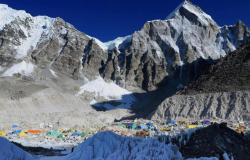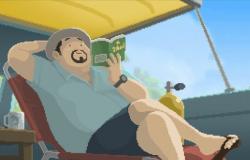
Francesca Lo Castro, do you remember the day you got sick with Covid?
“It was a Thursday in March 2020. I was in my office in London and I had chilblains on my hands: it was the first sign.”
No fever?
“No. Just a big cold. I had to wear gloves even at home.”
The very first wave.
“I remember a beautiful March. Mild. Every day I went out for a walk in the flowery parks.”
Then?
“On April 27th I get a big fever. Violent cough. I end up in the emergency room. But they don’t admit me. “She is young, she doesn’t risk her life”.
Do you manage your illness from home?
“The pneumonia doesn’t go away. I go back to the emergency room twice more, each time they send me home.”
And what does she do?
“I hold on to my uncle Franco, head nurse at the Garibaldi hospital in Catania. He guides me on the phone: sleep on your stomach, he tells me, breathe slowly so as not to suffocate. He explains to me how to use the pulse monitor correctly. Without him I would have died.”
If you type his name into Google the word Long Covid appears.
“In September 2020 they told me that my illness had become chronic. Pneumonia was replaced by pleurisy. After a year, following an alleged heart attack, I was diagnosed with chronic myocarditis and pericarditis. I find myself in a wheelchair.”
And alone?
“No, my boyfriend is with me, Dario Granato, Sicilian like me: I’m from Linguaglossa, on Etna, he’s from Randazzo. We have been together for twenty years. He never abandoned me.”
When did she arrive in London?
“At 18 years. I obtained a bachelor’s degree in international relations at the University of Westminster and then a master’s degree in public policy at University College London. I became a political advisor to the British consumer association, Which?”.
What dreams did you have in March 2020?
“We wanted to buy a house. Having a child. We travelled. I volunteered, and worked like crazy, diving into every possible assignment.”
What image do you see if you think back to before?
“Me going to the office by bicycle. I bought myself a nice folding Brompton so I could always carry it with me.”
And now, four years later?
“I practically live in bed. At 36 years old.”
What are the symptoms?
“Do you want them all?”
The main.
“A frightening asthenia. I don’t have the strength to do anything. Headaches. Nausea. In the summer I feel worse.”
In what sense?
“My body breathes, I can go out with a cane, people tell me “you’ve improved”. But that’s not true, because in the heat I feel worse mentally. It’s as if I fall into a mental fog, a sort of Alzheimer’s.”
How do you defend yourself?
“There is no defense. Can you hear my voice how angry she is?
I understand her.
“I have terrible anger inside me. I happen to think the worst.”
What is your biggest fear?
“I’d rather spend my whole life in wheelchairs than have my brain turned to jelly.”
Why didn’t she recover from Covid?
“The triggering syndrome is defined as dysautonomia. It affected my immune system like HIV. It’s as if I had developed AIDS, except that it didn’t arise from an HIV infection, but from a covid-19 infection.”
Has she been vaccinated?
“Four times. The vaccine saved my life. If I had contracted the virus once again I would certainly have died or worsened seriously, like other friends of mine who, having young children, cannot protect themselves from external agents.”
But at the same time it doesn’t get better.
“I have no hope.”
There is always hope.
“A cancer patient knows he can die, I know I won’t get better”.
Isn’t there a cure yet?
“In the USA they use antivirals, as for HIV-positive people. And in fifty percent of cases with good results. In Italian. There is a drug that Minister Speranza had bought, Paxlovid, but it was not used. In Great Britain they send it to your home if you are immunosuppressed.”
How many sick people are there?
“In Europe there are an estimated 36 million. But this is an underestimate. Six out of ten are women. And the younger we are, the more it kills us.”
What can we do for you?
“Talking about it. By consulting us. Listening to us”
You, as spokesperson for the Long Covid Network, wrote to Giorgia Meloni.
“To ask that Long Covid be recognized as soon as possible as a chronic debilitating syndrome with symptoms fluctuating over time. The State must invest in research. And give equitable access to diagnostic tests and supportive therapies.”
Did you get any answers?
“No”.
Do you sense an indifference from the institutions?
“Yes, but not just institutions. Even from society. Covid is like a ghost that you want to chase away. But we are the living ghosts of the virus.”
What is your typical day like?
“I’m almost always in bed, in my house in Linguaglossa. I filled the garden with English flowers. I study tirelessly, I consult experts, luminaries. Our patron saint is Danilo Buonsenso, the greatest researcher of pediatric Long Covid”.
Has your partner also returned to Sicily?
“Yes. And two months ago I got pregnant.”
Isn’t this a sign of hope?
“I was badly advised by gynecologists. They removed my spiral for endometriosis “she can’t get pregnant anyway”.
What will he do?
“I want to carry on with the pregnancy. Even though I have terrible nausea. We dreamed of a child. But not like this.”
How did it end with work?
“I lost it last year because Brexit doesn’t allow remote employment.”
What are you hoping for?
“In science”.
And what makes you suffer the most?
“Don’t be believed.”





